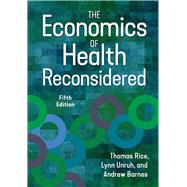The fifth edition of The Economics of Health Reconsidered continues to challenge the reliance on market forces to address health policy issues, and it argues instead for the value of government intervention. By critically examining economic theory as applied to the healthcare sector, the authors encourage readers to question the assumptions on which the perceived success of the competitive-healthcare-market model is based. This updated text focuses on how the unique characteristics of healthcare challenge the effectiveness of traditional economic remedies. Chapters explore demand and supply, equity, expenditures, and economic evaluations.
This edition’s updates include new chapters on:
• Social determinants of health that explores the effects of education, income, gender, sexual- and gender-minority identities, early childhood experiences, neighborhood effects, and race/ethnicity on demand for health
• Behavioral economics, including how decision making compares to the view assumed by the traditional economic framework
The book illustrates how the government plays a crucial role in making the healthcare sector not only more equitable but also more efficient.








